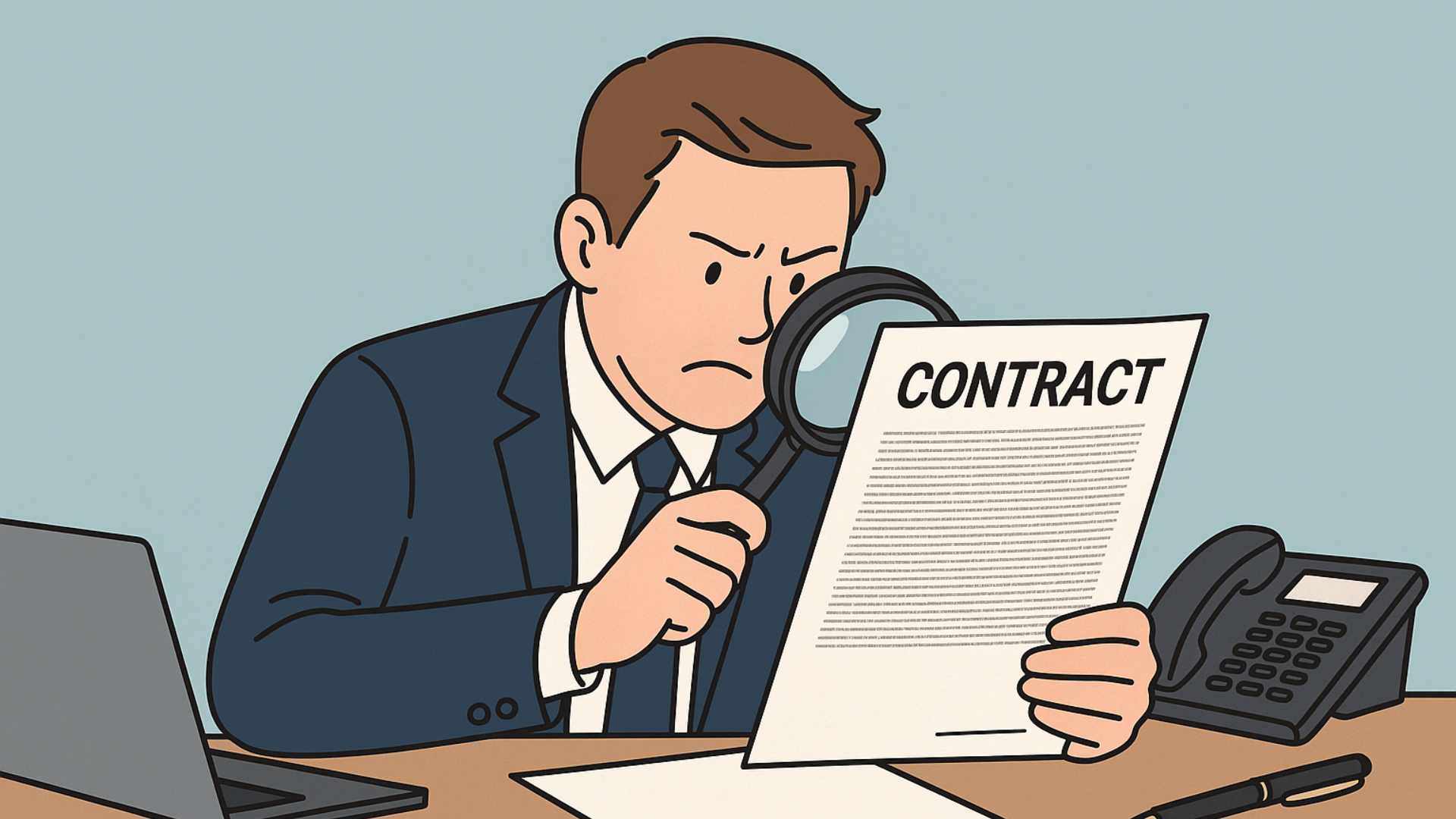Telecom Contract Auto Renewal Clauses: What Businesses Need to Know
June 17th, 2025
4 min read

Have you ever been caught off guard by a contract renewing automatically, locking you in for longer than you anticipated? If so, you're not alone. Many businesses encounter these clauses in telecom services, software agreements, or equipment leases—often without realizing the long-term implications until it’s too late.
Auto-renewal clauses aren't bad, but they can cause problems if not managed well. At TeleCloud, we believe in empowering businesses with the knowledge they need to navigate these agreements confidently.
This blog explores what auto-renewal clauses are, how they work, and steps to manage or avoid them. By understanding these clauses, you can negotiate better terms, prevent surprises, and explore solutions if you’re already locked into a contract.
What Is an Auto Renewal Clause?
An auto-renewal clause is a term in a contract that extends the agreement for a specific period unless the customer cancels within a set timeframe. These clauses are common in telecommunications, SaaS (Software as a Service), and equipment leasing.
Why Do Providers Use Auto Renewal Clauses?
- Continuity: Ensures uninterrupted service for customers.
- Cost Recovery: Helps providers recoup upfront costs such as free installations, hardware, or discounted rates.
- Revenue Stability: Guarantees predictable income for providers.
However, auto-renewals can complicate things for businesses. This is especially true if the terms are not clear or well-managed.
How Auto Renewal Clauses Work
Auto-renewal clauses are often found in contracts with set terms, such as 12, 36, or even 84 months. Here’s what to look for when reviewing your contract:
Key Elements
- Length of Renewal Period: Does the contract auto-renew for the same term as the original agreement, a shorter one, or switch to month to month (e.g., 12 months)?
- Notice Period for Cancellation: Providers typically require 30 to 90 days notice before the renewal date.
- Fees for Early Termination: Canceling during the renewal period may incur fees, such as payment for the remaining months or repayment of waived costs.
Provider Practices
- Transparent Providers: Some providers clearly outline renewal terms and send reminders before the renewal date.
- Hidden Terms: Others bury the clause in the fine print, leaving customers unaware until it's too late.
For small businesses with limited resources, missing a cancellation window can lead to extended contracts and financial strain.
Why Auto-Renewal Clauses Can Be Problematic
1. Unexpected Costs: Fees & Penalties
Auto-renewal clauses can cause surprise fees. This is common for businesses unaware of their renewal dates.
- Early Termination Fees (ETFs): Calculated as the remaining months on the contract multiplied by the monthly service fee.
- Repayment of Promotions: For original terms, providers may require repayment of free hardware, installation, or other discounts if the agreement is canceled early.
2. Limited Consumer Protections
Unlike personal consumer contracts, business agreements are not as heavily regulated. Businesses are expected to review terms carefully, making them less protected from unfavorable clauses.
3. Provider Tactics
Some larger providers, such as national telecom companies, may rely on bureaucracy and legal fine print to enforce auto-renewal terms. They know that disputing fees is costly and time-consuming. So, many small businesses choose to accept the terms instead of challenging them.
Financial Implications for Businesses
Small Businesses:
- Higher Risk of Financial Strain: Missing a cancellation window can lead to extended commitments and higher fees.
- Example: A small business auto-renewed for 24 months at $150/month faces $2,700 in fees if they cancel after 6 months.
Large Enterprises:
- Complex Contracts: Large businesses often manage multiple locations or departments under a single provider, making contract management more complex. Missing cancellation windows or auto-renewal clauses can result in substantial penalties.
- Example: A company with 10 locations, each on a $500/month contract, could face over $90,000 in fees if they cancel 6 months into a 24-month renewal. Coordinating contract end dates and negotiating terms across multiple locations adds further complexity.
Regulations and Legal Context
FTC Initiatives
The Federal Trade Commission (FTC) has begun addressing unfair auto-renewal practices, particularly in SaaS and subscription services. However, these protections often apply to individual consumers rather than business-to-business agreements, leaving businesses to navigate these clauses with less regulatory support.
State-Level Protections
Some states require providers to notify customers before auto-renewal, but compliance varies. Always check local regulations to understand your rights.
In New Jersey, the Automatic Renewal Law requires service providers to clearly disclose auto-renewal terms for contracts lasting 12 months or more. Providers must notify customers 30 to 60 days before the cancellation deadline, detailing how to cancel and avoid unintended renewals. While this law primarily applies to consumers, businesses in New Jersey should still review contracts carefully and consult legal experts when needed.
Best Practices for Navigating Auto Renewal Clauses
Before Signing a Contract:
- Review Terms Carefully: Ensure you understand the renewal period, cancellation notice requirements, and potential fees.
- Negotiate Favorable Terms: Ask for shorter renewal periods or month-to-month agreements after the initial term. The best option will depend on your business and the price differences your provider offers.
During the Contract Term:
- Track Renewal Dates: Set calendar reminders well before cancellation deadlines to avoid missing the notice period.
- Monitor Provider Communication: Pay attention to renewal notices, which may be included in bills or sent via email.
At Renewal Time:
- Proactively Negotiate: Talk to your provider about renewal terms. Check for new rates, services, or options.
- Explore Alternatives: Consider whether switching providers or renegotiating terms better suits your business needs.
Equipment Leases vs. Service Contracts
Not all auto-renewal clauses are created equal. Equipment leases, often managed by banks or leasing companies, can be more rigid than service contracts. Unlike service providers, banks are less flexible and may impose strict terms for early termination or renewal.
Example:
A business leasing hardware may be required to return all equipment before the contract’s end to avoid auto-renewal. Failure to meet these deadlines can result in extended terms or additional fees.
The Provider-Customer Relationship in Renewals
The experience you have with auto-renewal clauses often depends on the provider.
- Larger Providers: May use automated systems and provide little communication about renewals. Customers with dedicated account managers may have a better experience.
- Smaller Providers: Often more transparent and flexible, with personalized communication and customer-centric policies.
At TeleCloud, we reach out before renewals to review your needs and ensure your agreement matches your goals. Our account managers offer personalized advice, clear communication, and tailored recommendations. This way, you won't be stuck with services that don't fit your business anymore.
Key Takeaways: What to Watch for in Auto-Renewal Clauses
Checklist for Customers:
- How long is the renewal period?
- What is the required notice for cancellation?
- Are there fees for canceling during the renewal period?
Auto-renewal clauses don’t have to be a source of frustration or unexpected costs. By understanding how these clauses work, businesses can avoid costly surprises. They should carefully review contracts and meet key deadlines.
How to Navigate an Unfavorable Agreement
Whether you’re a small business trying to navigate limited resources or a larger enterprise managing multiple locations, taking the time to evaluate your contracts and negotiate terms that align with your needs can save you time, money, and stress in the long run.
At TeleCloud, we make it easy to take charge of your telecom agreements with a Free Telecom Bill Audit. This no-obligation service helps you uncover potential savings and optimize your setup. To get started, check out our Telecom Bill Audit Blog for practical tips on understanding your bill and navigating contracts with confidence.
With the right knowledge and expert support, you can take control of your telecom costs and ensure your solutions empower your business.
damon@telecloud.net







